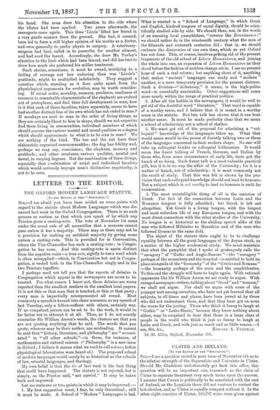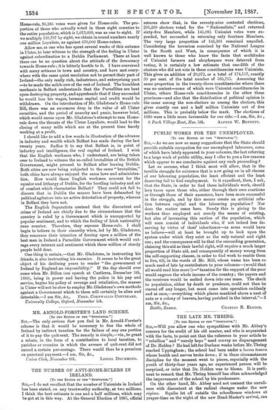ULSTER AND IRELAND.
(To THE EDITOR Or THE ' SPECTATOR:1
Srm—I see a question raised in your issue of November 5th as to the relative strength of the Separatists and Unionists in Ulster. Should Mr. Gladstone unfortunately get back into office, this question will be an important one, inasmuch as the claim of Ulster to separate treatment very much tarns upon the answer. I assume that Cavan is politically to be associated with the rest of Ireland, as the Loyalists there did not venture to contest the last election, and as Ulster is equally compact without it. In the other eight counties of Ulster, 119,797 votes were given against
Home-rule, 85,185 votes were given for Home-rule. The pro- portion of those who actually voted in these eight counties to the entire population, which is 1,613,600, was as one to eight. If we multiply 119,797 by eight, we obtain in round numbers nearly one million Loyalists, as against 670,000 Home-rulers.
Allow me, as one who has spent several weeks of this autumn is Dieter, to bear witness to the strength of the feeling in Ulster against subordination to a Dublin Parliament. There at least there can be no question about the attitude of the democracy towards Home-rule; it is bitterly hostile to it. I have conversed with many artisans in town and country, and have met every- where with the same quiet resolution not to permit their part of Ireland—the only really rich, industrious, and enterprising part —to be made the milch-cow of the rest of Ireland. The humblest mechanic in Belfast understands that the Parnellites are bent upon destroying property, and apprehends that if they succeeded he would lose his wages, because capital and credit would be withdrawn. On the introduction of Mr. Gladstone's Home-rule Bill, there was an enormous drop in the value of all Ulster securities, and the period of anarchy and panic, however brief, which would ensue upon Mr. Gladstone's attempt to ram Home- rule down the throats of the Ulster Loyalists, would lead to the closing of many mills which are at the present time barely working at a profit.
I should like to add a few words in illustration of the advance in industry and wealth which Belfast has made during the last twenty years. Suffice it to say that Belfast is, in point of industry and intelligence, the real capital of Ireland. I wish that the English workmen who, I understand, are being taken over to Ireland to witness the so-called brutalities of the British Government, might proceed to Belfast after leaving Dublin. Both cities are now being subjected to the same "brutalities," both cities have always enjoyed the same laws and administra- tion. How would these English workmen account for the squalor and lethargy of Dublin, for the bustling industry and air of comfort which characterise Belfast ? They could not fail to discern that in Dublin the masses have been debauched by political agitators into an active detestation of property, whereas in Belfast they have not.
The English Separatists contend that the discontent and crime of Ireland are chiefly due to the circumstance that the country is ruled by a Government which is unsupported by popular sentiment, and to which the feeling of Irish nationality runs counter. Therefore, they espouse Home-rule. I shall begin to believe in their sincerity when, led by Mr. Gladstone, they renounce their intention of forcing upon a million of the best men in Ireland a Parnellite Government which would out- rage every interest and sentiment which these million of sturdy people bold dear.
One thing is certain—that Mr. Gladstone, in instructing his friends, is also instructing his enemies. It seems to be the great object of his declining years to render "the government of Ireland by England an impossibility." If the day should ever come when Mr. Dillon (see speech at Castlerea. December 5th, 1886), being in power and having the police in his pay and service, begins his policy of revenge and retaliation, the masses in Ulster will not be slow to employ Mr. Gladstone's own methods against a Government which to them will certainly be alien and detestable.—I am Sir, Am., FRED. CORNWALLIS CONYBEARE.
University College, Oxford, November

































 Previous page
Previous page